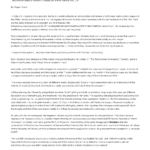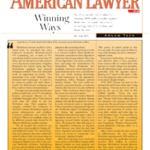Top #4 Ten Jury Verdicts of 2004
Doctor $570 Million For His Inventions
Money To Go To Charity For Medical Research
January 3, 2005 | By Amy Johnson Conner
When a California medical device manufacturer sued the inventor of a revolutionary spinal treatment, claiming it owned all his past and future inventions, it got more than just pie in its face.
The inventor counter-sued and won a $570 million verdict against the company.
The inventor, Dr. Gary K. Michelson, had developed a procedure that could provide pain relief to patients with relatively non-invasive surgery. The invention included both surgical technology and a system for spinal regeneration.
After reaching a manufacturing agreement, the company - Medtronic Sofamor Danek of Memphis, Tenn. sued Michelson for marketing his other inventions to other companies.
The doctor counter-sued for breach of contract and patent infringement, claiming that Medtronic did not pay sufficient royalties for the spinal device and failed to promote his other inventions because they would compete with the company's other products.
According to Los Angeles attorney Robert Krupka, one of the reasons the company filed suit against his client was that it thought he would back down.
Dr. Michelson testified that he was told this personally by an in-house attorney at Medtronic, and his legal team entered a document into evidence that referred to the lawsuit being filed to force a settlement.
"They thought this case was going to settle, Dr. Michelson spent $62 million fighting this fight. Nobody believed any individual would devote $62 million of their personal fortune [to an endeavor like this]." - said Krupka
Memphis attorney Leo Bearman referred calls for comment to his client, Medtronic Sofamor Danek, which plans an appeal.
According to Marc Marmaro of Los Angeles, who also represented Dr. Michelson, the relationship between the two parties was an important part of his case theme. "The other side had all the power, they controlled the information, they had the technology under their dominion. We argued that the power was not used in the way it should have been used. For example, our client was entitled to name attribution under the contract. They had the power to comply, and testimony showed it didn't cost any more to comply." - said Marc Marmaro.
But the company did not make good on this promise.
After deliberating one month, the jury denied all of Medtronic's claims and awarded Dr. Michelson nearly $160 million in compensatory damages and $400 million in punitives.
Revolutionary Spinal Products
Dr. Michelson holds more than 200 U.S. and 450 foreign patents and applications covering inventions and techniques related to spinal fusion, surgical implants and surgical techniques. He invented a series of spinal implants and instruments for the insertion of these implants that are minimally invasive.
"Everyone agrees [these inventions] revolutionized the way the spine is treated for degenerative disc disease. What these implants do is replace the discs and promote fusion between two adjacent vertebrae, so the spine is stable and pain free." - Krupka said.
In 1994, Michelson entered into an agreement with Sofamor Danek, which had yet to be bought by Medtronic. At the time, both parties understood that this agreement covered only those inventions Michelson had developed to date.
The agreement got more complicated as Michelson developed new inventions. He began negotiations with the company, but Krupka said that in his desire to get the products out to the public, his client agreed to let the company begin developing them even before a final agreement was reached.
"Everything went along reasonably well until 1998, when Sofamor Danek was bought by Medtronic and became Medtronic Sofamor Danek. New management had a different perspective about how things ought to be done." - Krupka said.
Medtronic continued negotiations for Michelson's latest work, but they bogged down on a variety of issues, including royalties, name attribution and Michelson's desire to ensure the inventions were made available to the public rather than shelved.
"As a spinal surgeon he helps patients one at a time. As an inventor, he helps millions at a time. His whole interest is in helping patients. The only way that would happen is if his inventions were put into practice, not put on a shelf." - Krupka said.
Medtronic, in turn, wanted to retain control over which products would be put on the market.
As negotiations crept along, Michelson's inventions began reaching the market, and due to their popularity, they became an increasing proportion of Medtronic's total revenues. This created problems because Michelson was receiving a 10 percent royalty, nearly double the normal royalty.
The result was a negative impact on Medtronic's profitability, Krupka explained. In June 2000, the dispute took on a whole new tone when Medtronic took the position that the agreement signed between Michelson and Sofamor Danek in 1994 actually covered all the inventions Michelson had invented or ever would invent.
| AT A GLANCE | |||
| Verdict: | $570 million total $400 million in punitive damages | Case Name: | Medtronic Sofamor Danek, Inc. v. Michelson |
| State: | Tennessee | Date of verdict: | Oct. 12, 2004 |
| Type of case: | Intellectual property, contract | Trial: Deliberations: | 3½ months 1 month |
| Attorneys for Dr. Michelson: | Robert Krupka of Kirkland & Ellis in Los Angeles; Marc Marmaro and Stan Gibson of Jeffer, Mangels, Butler & Marmaro in Los Angeles | Lead attorney for Medtronic: | Leo Bearman of Baker, Donelson, Bearman, Caldwell & Berkowitz in Memphis, Tenn |
| Status: | Ruling pending on estimated $60 million in unpaid royalties. Ruling also pending on how the contract should be interpreted in the future | ||
Michelson balked, and in May 2001, Medtronic filed suit for breach of contract and fraud, claiming Michelson had fraudulently withheld rights to new inventions. The company sought damages totaling $800 million, Krupka said.
Michelson countersued for breach of contract, tortuous interference and patent infringement, and also claimed Medtronic intentionally underpaid his royalties. He sought damages of $1.7 billion.
He Said, They Said
 Gary Karlin Michelson, M.D. of Karlin Technology, Inc., and attorney Robert G. Krupka pose in Memphis, Tennessee on September 8, 2004. Michelson created devices, tools and surgical procedures that made it easier and less painful for people to have back surgery and signed agreements in 1994 with a company later bought by Medtronic. Medtronic and Michelson are fighting over ownership of the inventions, which are part of Medtronic's spinal implant business. (Photo by Scott Hartsfield/Bloomberg via Getty Images)
Gary Karlin Michelson, M.D. of Karlin Technology, Inc., and attorney Robert G. Krupka pose in Memphis, Tennessee on September 8, 2004. Michelson created devices, tools and surgical procedures that made it easier and less painful for people to have back surgery and signed agreements in 1994 with a company later bought by Medtronic. Medtronic and Michelson are fighting over ownership of the inventions, which are part of Medtronic's spinal implant business. (Photo by Scott Hartsfield/Bloomberg via Getty Images)
One of the difficulties in the case was that because Michelson had handled all of the contract negotiations himself, he was the only witness his lawyers could call to testify about the technology he developed and the contracts he signed with the company.
Although Michelson was listed as the defendant in the case, the judge agreed with Krupka's motion that allowing him to go first would make for a more orderly presentation.
The first goal for Michelson's team was to help the jury understand what he had invented, why it was important in the treatment of spinal problems, and how it lessened blood loss, recovery time and pain for patients. This w as done through Michelson and other expert witnesses.
"We showed the jury how it worked, compared it to prior procedures, and showed how the surgery was done." - said Marmaro.
When it came to the details of his patents and contracts with Sofamor Danek, by far the biggest challenge . was convincing a jury that Michelson was telling the truth - and the 23 defense witnesses from Medtronic were not.
"How do you get a jury to believe that what Dr. Michelson is saying is true, [rather than the testimony of more than] 20 witnesses for Medtronic?" - Krupka said.
There are several ways. First, prepare the case well.
"We spent, literally, weeks with Dr. Michelson going over the facts and what happened, almost on a day-by-day basis. We had the benefit of the fact that he has a remarkable memory and tells the truth," - Krupka said.
Krupka pointed this out on redirect. After a deposition that took six full days to complete, attorneys for the company attempted to impeach Michelson on only one fact.
Opposing counsel had asked Michelson whether he'd ever written a chapter of a textbook. In his deposition he answered that he had not, but at trial he said he had. Krupka showed during his questioning that the confusion arose because Michelson had, since the deposition, authored two chapters in two textbooks.
As the testimony continued, Michelson's attorneys told his story through adverse witnesses.
"We showed how what they were saying or claiming not to remember was contradicted by the documents, and in some cases [their own] depositions," - Marmaro said.
"My advice to other lawyers is what they've heard many times before, but you really need to do it - get the facts early in the case and keep focusing on revising those facts as new information comes forward," Krupka said.
Krupka also counted on the jury to recognize who was telling the truth. "They may not be able to understand all the technical details inherent to patent infringement cases and complex commercial contract cases. Understanding how spinal surgeries work is difficult to learn over the course of a trial. But juries are very good at figuring out who is telling the truth and who is not, and who knows what they're talking about and who is telling them a story." - Krupka said.
To assist jurors in making this determination, Krupka focused his case on the people who made the decisions, rather than the corporation.
"When you present a case for or against a corporation, focus on the people, because that's what the jury and the judge will focus on. There is no such thing as a corporation separate and apart from its people. Pick your witnesses and present your side on the people scale instead of the corporate scale." - Krupka said.
Michelson's case took two months to present.
"We called 23 witnesses. Virtually all of them, other than our experts and Dr. Michelson, were adverse," - Krupka said.
Michelson's testimony alone lasted seven days.
Document Issues
Krupka said this was the most complex case he's ever worked on, involving the infringement of six patents and 13 complex commercial contracts. It was also the most hard fought, largely because of the documents.
"We fought long and hard to get access to the documents of Medtronic, and they fought long and hard to keep us from getting access to them," - Krupka said.In fact, the discovery battle got so out of hand that the judge appointed a special master to hear arguments and decide the motions concerning documents.
Medtronic had listed more than 17,000 documents as privileged.
Challenging the privilege claims was complicated by the fact that Michelson had been an expert witness for Medtronic in the past and knew one of its secrets. While serving on Medtronic' s side during this earlier litigation, Michelson had been told that the company's strategy was to list troubling documents on the privilege logs to keep them from the other side, Krupka said.
So he and his team scoured the list of documents and challenged 9,000 of them. Ultimately, the special master agreed with Krupka about 7,000 of them.
"We spent tens of millions fighting about production of documents and electronic documents ... and we only got some of them," - he said.
To make matters worse, many documents they received and used at trial were received after the close of discovery, which meant they could not ask witnesses about them directly, they could only use them as background to develop their line of questioning, Krupka explained.Defense Blunders
The defense case took about six weeks. Krupka thinks Michelson's case was bolstered by the blunders made by opposing counsel.
"We thought several moves ahead and understood the consequences of the positions we took," - Krupka said.
The other side, apparently, did not.
For example, opposing counsel argued during discovery that the details of how they determined that a product was royalty-bearing were irrelevant.
"That was a major dispute between the parties, the essence of a $90 million compensatory award and $300 million of the punitive award," - Krupka noted. Because lawyers had been involved in making these decisions, the two sides battled over whether this information was privileged. Krupka decided his client would testify about these matters, even if he had to disclose what he had discussed with lawyers. The company took the opposite approach.
That backfired later in the case when opposing counsel wanted to use this same information. The judge ruled for Krupka when he objected, arguing that the opposing side shouldn't be allowed to enter that evidence after refusing to provide it to Michelson's lawyers during discovery.
"Time and again the other side got caught having taken one position at one time in the case and wanting to take a different position later," - Krupka said.
Calculating Damages
Arguing for damages was also complicated.
"The damages calculation was difficult to understand because you're looking at what something would have been worth in the future if Medtronic hadn't done what it did. It's a difficult concept to understand. You have to present it in a way that makes sense to a normal person as opposed to an economist who sits in a professor's office at a college and tries to think about how things could be or should be instead of how things are. The rule I've learned to use is, if you explain it and somebody says, 'That doesn't make sense to me/ and you say, 'Yes, but...' then you've already lost." - Krupka said.
Rather than ask for a bulk sum in damages, Krupka and Marmaro broke down the claims into subject areas and presented jurors with damages for each area.
"A major part of the case was royalties that weren't paid on a number of products, and other damage queries involving reasonable royalties for patents. We put on an expert to testify about that," - Marmaro said.
Michelson's attorneys asked for $1.7 billion in damages, according to the Minneapolis- St. Paul Star Tribune.
A Month of Deliberations
The jury got the case Aug. 28 and rendered a verdict on compensatory damages Sept. 28. Jurors rejected all the claims by Medtronic and found that the company breached license agreements, engaged in wrongful conduct, infringed six patents owned by Michelson and intentionally underpaid royalties.
The jury awarded Michelson (and his company, Karlin Technology) approximately $110 million in compensatory damages, as well as a 10 percent royalty on Medtronic's gross revenues of the implants, instruments and methods used in the patented systems - an amount estimated at nearly $60 million, bringing the total compensatory award to nearly $160 million.
The punitive damage award, handed down on Oct. 12, totaled $400 million.
Leo Bearman, the Memphis attorney who represented Medtronic, referred comment to Medtronic Sofamor Danek, which said in a written statement that the award is excessive and that the company will pursue post-trial motions and appeal.
"Even before the verdict, [the company] took steps to address a number of the issues in this case and will undertake further evaluation of the jury's determinations to assure compliance with the provisions of our agreements with Dr. Michelson and his company," - the statement said.
$62 Million In Costs
By the time the case ended, Michelson and Karlin Technology had spent $62 million in legal fees and trial costs. At its peak, there were 60 people from two firms working on the case. Most of the time the number of people working on his side of the case numbered about 40, according to Krupka.
"It is an astronomical sum. Medtronic basically took the position that they were going to fight everything, and any time they lost, they filed a motion for reconsideration. This is the most hotly contested litigation I've ever experienced. Medtronic spent $2 for every dollar they forced Dr. Michelson to spend. [My client and Karlin Technology] paid that money out of their pockets to fight this case. What choice did he have? They were suing him for $800 million. He didn't pick this fight, they did." - Krupka said.
A trust owns Karlin Technology and the major beneficiary of that trust and the jury's award-is a charitable foundation that plans to fund medical research. Michelson donated some of his inventions to Karlin Technology, which currently has two employees - at its peak it had 10.
References
- Doctor Wins $570 Million For His Inventions [2005.01.03. Amy Johnson. Conner. Lawyers USA]
- Medtronic vs. Michelson | Michelson Patents






![[Pg. 1] IP Litigation A wards, Settlements Reach Record Highs Portfolio Media, New York (November 5, 2005)](https://www.michelsonmedicalpatents.org/wp-content/uploads/2005/11-05-ip-litigation-awards-settlements-reach-record-highs-portfolio-media/ip-litigation-awards-settlements-reach-record-high-portfolio-media_Page_1-495x400.jpg)
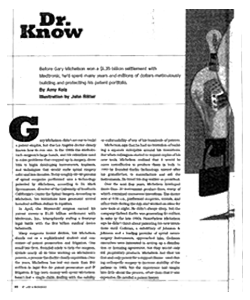
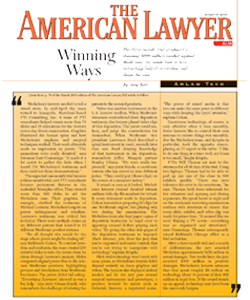
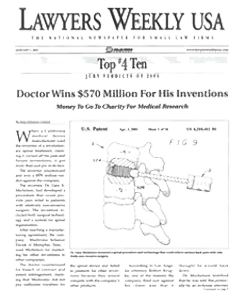
![Krupka - LAWYERS WEEKLY: Top 10 Verdicts of 2004 Krupka [Article | 2005-01-03] Page 1 of 4 Krupka - LAWYERS WEEKLY: Top 10 Verdicts of 2004 Krupka [Article | 2005-01-03] Page 1 of 4](https://www.michelsonmedicalpatents.org/wp-content/uploads/2005/01-03-lawyers-weekly-usa-krupka/lawyers-weekly-january-2005-doctor-wins-570m_Page_1-232x300.jpg)
![Krupka - LAWYERS WEEKLY: Top 10 Verdicts of 2004 Krupka [Article | 2005-01-03] Page 2 of 4 The Lawyers Weekly article "Top 10 Verdicts of 2004" features a major court decision in favor of Dr. Gary K. Michelson in his intellectual property dispute with Medtronic. The ruling allowed Dr. Michelson to jump start his career in philanthropy.](https://www.michelsonmedicalpatents.org/wp-content/uploads/2005/01-03-lawyers-weekly-usa-krupka/lawyers-weekly-january-2005-doctor-wins-570m_Page_2-232x300.jpg)
![Krupka - LAWYERS WEEKLY: Top 10 Verdicts of 2004 Krupka [Article | 2005-01-03] Page 3 of 4 Krupka - LAWYERS WEEKLY: Top 10 Verdicts of 2004 Krupka [Article | 2005-01-03] Page 3 of 4](https://www.michelsonmedicalpatents.org/wp-content/uploads/2005/01-03-lawyers-weekly-usa-krupka/lawyers-weekly-january-2005-doctor-wins-570m_Page_3-232x300.jpg)
![Krupka - LAWYERS WEEKLY: Top 10 Verdicts of 2004 Krupka [Article | 2005-01-03] Page 4 of 4 Krupka - LAWYERS WEEKLY: Top 10 Verdicts of 2004 Krupka [Article | 2005-01-03] Page 4 of 4](https://www.michelsonmedicalpatents.org/wp-content/uploads/2005/01-03-lawyers-weekly-usa-krupka/lawyers-weekly-january-2005-doctor-wins-570m_Page_4-232x300.jpg)
